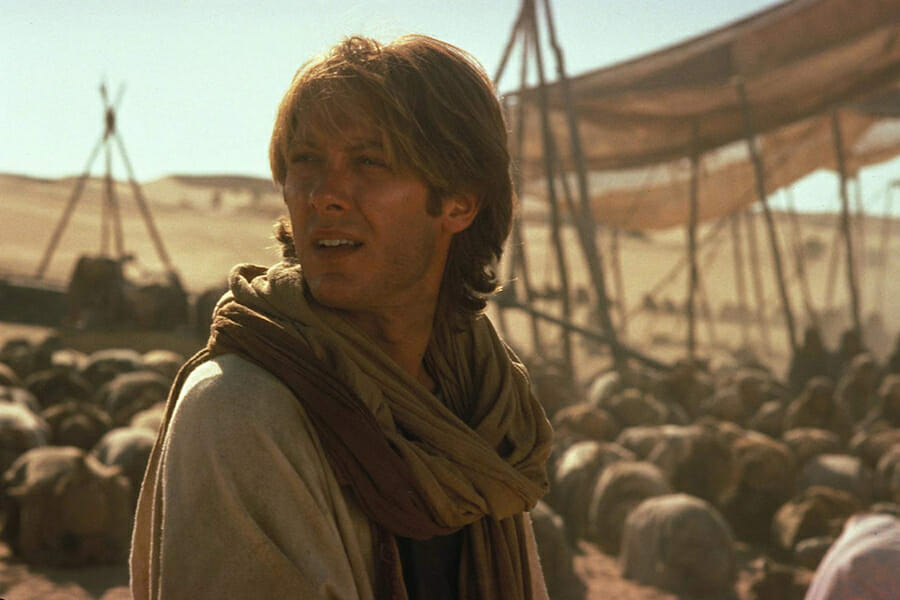
‘Stargate’: David Arnold’s First Blockbuster Score
Twenty years ago, British film composer David Arnold dazzled the film music community with his first blockbuster, symphonic score: Stargate (1994). The $55 million budget film starred Kurt Russell and James Spader. Afterward, Arnold penned powerful works like Independence Day (1996), Tomorrow Never Dies (1997), Godzilla (1998), The Musketeer (2001), and Casino Royale (2006).
He is now a bankable, first-tier name in the business. But something about Stargate—the blend of black magic and sparkling innocence in the soundscape—has never been duplicated in his discography.
The Stargate music has aged better than the film itself, which hinges on a strange premise. The plot concerns Americans finding a space-time portal in contemporary Egypt that travels to a planet that resembles ancient Egypt—except the pharaohs are tricked out with ultra-high-tech weaponry.
The epic score speaks to all the themes and settings the film. Its moments of major-key ebullience somehow transcend the tomfoolery of the plot. Thanks to an excellent recording, all the instruments ring clearly. The brass in particular has a “pure,” noble tone.
“When I first read the script for Stargate,” David Arnold says, “I knew what approach to take, which was to be as big and bold as possible. As a fan of science fiction, I’ve always loved unashamedly bold music and movies. I love the grand gesture, the broad sweep and the big strings.”
To director Roland Emmerich, Arnold proposed “basically Star Wars meets Lawrence of Arabia.”
The pseudo-Egyptian set pieces and space portal imagery on the film also inspired Arnold’s composition. Arnold recalls actor James Spader on set: “Every time there was an amazing sight, the characters would stand back and say, ‘Oh my God!’ But James would just smile and walk towards it. That was the basis for the Stargate score, moving forward with a sense of majesty instead of being frightened by what’s around the corner.”
This spirit of adventure is evident in the first cue on the deluxe edition score album, “Stargate Overture.”
The track opens with the film’s exploration theme, well-stocked with brass flourishes and percussive garnishes. It finishes with primal chanting that characterizes the villainous alien pharaohs of the film.
The score is best when it develops the exploration theme. The cue, “Giza, 1929,” brings choral accompaniment into the theme, along with royal trumpet blasts.
“The Stargate Opens” highlights the portal imagery with lush strings melody. The support brass is majestic and bright.
“You’re on the Team” features a solemn military march.
“Entering the Stargate” and “The Other Side” likewise point to the wonder of space and time travel.
“Mastadge Drag” provides a light, comic interlude between heavy orchestral salvos. It narrates the foibles of American archaeologist Daniel Jackson on the alien planet featured in the film. He is dragged across the desert by an alien, camel-like animal called a “Mastadge.”
The high-tempo cue recalls the playfulness of John Williams’ score for Hook (1991). The trumpet players must have taken a day of bed rest after laying down this powerhouse track. For film music enthusiasts looking for a single cue that demonstrates the quality of the genre, “Mastadge Drag” is a great choice.
“Daniel and Shauri” introduces a cross-cultural romance theme enunciated by flutes. “The Kiss/The Seventh Symbol” reinforces this elegant theme before seguing into the exploration theme and the march.
“Coming Home” transposes the exploration theme to woodwinds with gorgeous results and then concludes the body of the film with a brass cannonade.
“Closing Titles (Intro),” sees the return of the “Mastadge Drag” theme for an audience-rousing encore.
Some of Stargate’s action cues for the villains can be cacophonous and grating on the ears. Nonetheless, the rest of the score is enormously imaginative and evocative of exotic worlds beyond ours.
“Sometimes as a writer you can do that,” says David Arnold, “sometimes you don’t, but you always aim to write the thing that is the key to cluing people in as to what it is they’re about to experience and drawing them into the world that you’re creating.”
For composer David Arnold, Stargate led to Independence Day, which led to work on the James Bond franchise. It was his career launching pad. And his career has gone far and wide.
But neither time nor the fickle fashions of Hollywood have lessened the luster of Stargate.
